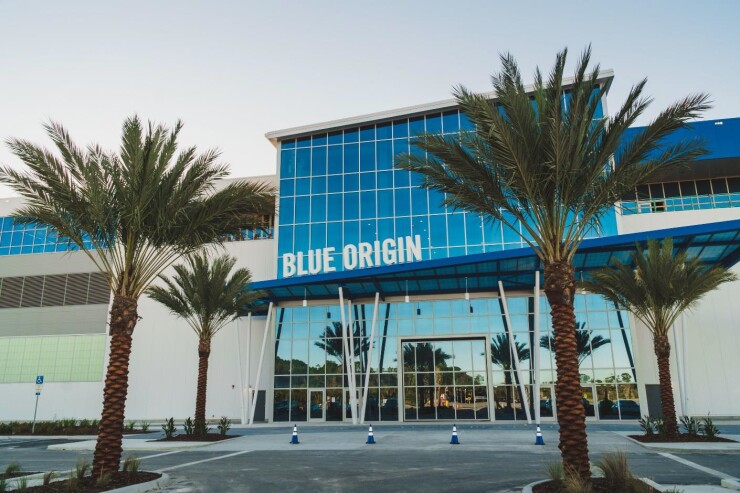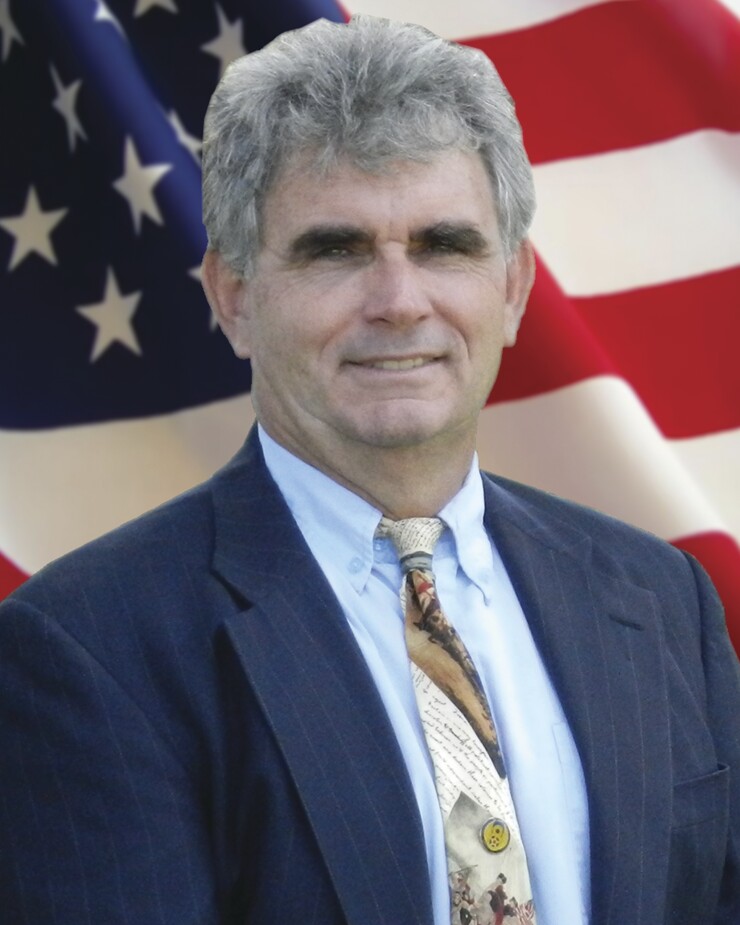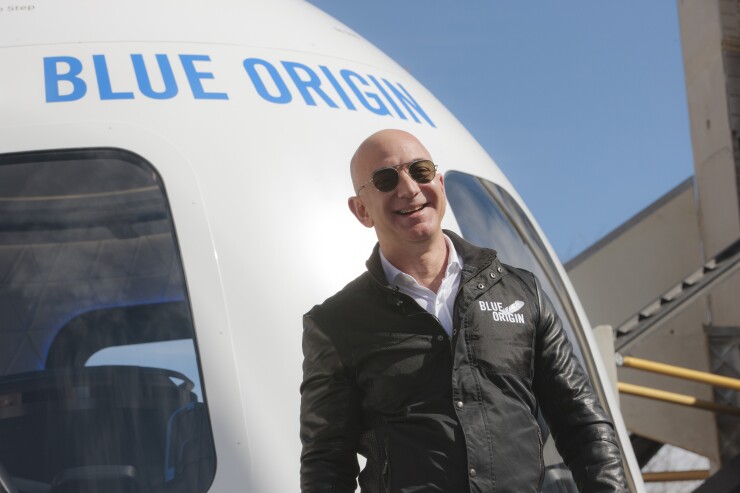The lure of high-paying jobs at a spaceship factory owned by the world's richest man motivated Brevard County, Florida, to support the deal with an economic incentive grant.
The county agreed to pay $8 million as part of an incentive package for Jeff Bezos to locate his aerospace company, Blue Origin, near Kennedy Space Center, though its plans to raise the money by issuing bonds hit a legal roadblock.

With visions of rockets blasting off from a nearby launch pad, winning the project was a coup for Florida’s Space Coast and Brevard County, still reeling from job losses after NASA shut down the space shuttle program.
A hiccup in the plan developed after the county decided to borrow the $8 million over 10 years to make a one-time cash payment to Blue Origin.
“I didn’t think it was legal,” said Brevard County Clerk of the Circuit Court Scott Ellis.
Brevard County and the North Brevard Development District filed a complaint asking a court to validate the bonds so that their legality couldn’t be challenged in the future.
Ellis filed a motion to dismiss the complaint in April.
“This was a new type of security and they were bonding something we never bonded before,” Ellis said in an interview with The Bond Buyer. “You can’t bond for an operating expense and [the county] tried to classify the jobs grant as a capital expense.”
Circuit Judge Jeffrey Mahl
Mahl said that the county and the district failed to prove they had authority under Florida law to issue the bonds; that the proposed issuance served a paramount public purpose; and that the bonds complied with all applicable Florida laws, including the county’s charter.
“The court finds plaintiffs have not met their burden on all three prongs,” he said.
Bond validations are rarely denied in Florida, according to a bond attorney not involved in Brevard’s case, who asked not to be named.
When validations are denied, appeals go directly the Florida Supreme Court.
Brevard County Attorney Eden Bentley and the firm representing the county in the validation case, Nabors, Giblin & Nickerson PA, did not respond to requests for comment on the ruling or whether the county plans to file an appeal.
Ellis was represented by J. Carter Andersen, David Banker, and Cate Parsley from Bush Ross PA in Tampa, and the clerk’s staff attorney Rebecca E. Lober.
Andersen said the ruling protects against frivolous borrowing and spending, and forces the county to use available funds to pay for grants.
“The court decided that the county cannot borrow from the future to pay operating expenses of today,” Andersen said. “If the county wants to award cash job creation grants with the hope of stimulating economic growth it cannot borrow from the future to do so.”
Even if Brevard County can’t borrow to pay for its incentive grant, the Blue Origin manufacturing complex project will proceed.
Brevard’s incentive agreement with the company allows the county to pay the $8 million in interest-free installments over six years.
The Space Coast still wins a major job-maker with a billionaire backer.
The purpose of Bezos’ manufacturing facility is to build, test, and deliver an orbital launch vehicle capable of carrying large payloads, cargo, crew and paying passengers into space, according to testimony by Scott Henderson, vice president of Test and Flight Operations.
Bezos, the founder and CEO of Amazon.com, is widely reported to be the world's wealthiest man, largely on the strength of his considerable holdings in Amazon stock.
“Blue Origin's vision is to support millions of people working and living in space,” Henderson said, testifying about the progress the company has achieved since locating in Brevard County.
The company was required to make a minimum capital investment of $160 million to build a 250,000 square foot manufacturing facility.
Henderson said the company upsized the building to 653,000 square feet at a cost of more than $232 million.
Blue Origin was also required to hire 36 workers by this December, and to fill 330 jobs by December 2026, all with an average annual salary of $89,000.
As of June, Henderson said the company had filled 117 jobs.
“It is substantially complete now,” he said of the building. “We have a partial certificate of occupancy, which covers about 85% of the facility.”
Ownership of Blue Origin’s building will be transferred to Space Florida, the state’s aerospace and spaceport development authority, when a final certificate of occupancy is issued. Brevard will be required to begin making payments on its cash incentive within 120 days.

Henderson said the company has an exclusive operating sublease on the property with Space Florida that runs through 2065.
“We are receiving in-kind credit for the investment that Blue Origin made and that in-kind credit is in the form of rent,” he said.
Brevard County’s incentive payment, Henderson also said, is not a contribution toward infrastructure because the company was required to invest its own money to build the facility.
In a deposition for the validation case, Henderson said he led the company’s site selection effort, which included a package of economic incentives.
In addition to free rent, he said the Florida Department of Transportation provided a space port infrastructure grant of $43 million; an FDOT aviation fund gave $10 million and another $2.75 million was received for road widening; a workforce development entity in Brevard County provided $1.8 million; and the North Brevard Development District agreed to give $8 million.
To get better financing rates, Brevard County decided to issue notes to finance the incentive grant because of its credit ratings — AA-plus from Fitch Ratings and Aa3 from Moody's Investors Service.
The county planned to pledge its covenant to appropriate non-ad valorem revenues annually to pay the debt, with payment ultimately from the district’s tax increment financing revenues.
Mahl found that the county and the district failed to demonstrate they had the legal authority to issue the bonds in Florida’s statutes — the first prong of the validation test.
“A plain reading of the statute does not, as plaintiffs contend, authorize issuing bonds to make grants to private enterprises,” he wrote. “The constitution and general law prohibit counties from issuing bonds to fund operating expenses, such as economic development grants.”
Mahl said the proposed bond issuance was for a “paramount private purpose,” a determination that meant the proposed bond issue failed the second validation test.
“The Florida Supreme Court has denied bond validation where the paramount purpose of bonds was to finance a private enterprise for private profit, which would be under the exclusive possession and control of a private entity,” he wrote. “Every dollar of the $8 million grant will exclusively benefit Blue Origin; the county will not have any ownership in or control of the facility.”

On the third prong of the test, Mahl said the plaintiffs also failed to demonstrate that the proposed bond issue complies with the law because it would violate state law and the county’s charter.
The charter states, “No proceeds of instruments of indebtedness shall be issued to finance current operations of county government, except that part of current expenses directly allocable to capital projects.”
During the validation trial July 30-31, the county’s financial advisor, Jay Glover, testified that he had never advised a Florida client on a transaction that involved borrowing money to finance an economic development grant to a private party.
Glover, a managing director for PFM Financial Advisors LLC, also estimated that the financing could cost the county between $1 million and $2 million in interest expense.
Ellis, the county clerk, contended that Brevard County was being used as a test case to determine if economic development zones and similar districts could legally finance grants.
“This case was important for the clerk to ensure the county could not obtain unfettered power to bond operational expenditures,” Ellis said. “The case had potential statewide significance and we are very thankful to have prevailed.”





